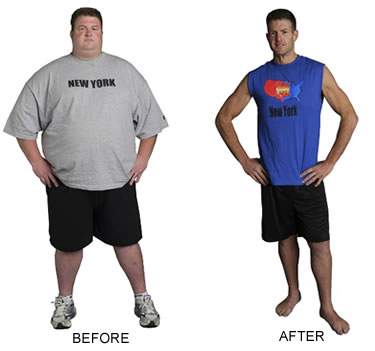Yesterday, after a long day, my wife and I settled in for some time to chill out, and turned on the TV. Although I'd never watch it on my own, I know my wife is a fan of watching The Biggest Loser, so I joined her for an episode last night. And to be completely fair, I think it's a wonderful thing to help make people conscious about their bodies, their diet, their lifestyle, and how to have the life they want. The results of the people who succeed at this are truly spectacular.

They're doing "couples" this season; there are mother-daughter teams, father-son, husband-wife, sisters, best friends, and cousins. Everyone started out -- realistically -- as morbidly obese, with no real direction as to how to improve themselves. But after 4 months or so of being at the compound (a.k.a. "We're gonna train you to eat and exercise like a professional athlete"), people have lost anywhere from 95 to 145 pounds! Pretty impressive, no?
But they got towards the end of the episode, and my brain broke just a little bit. Here's why: they have each person weigh-in, and they work the elimination criteria as follows:
- Everyone takes their weight from the previous week and weighs in, getting their weight for this week.
- They take the difference of those two numbers, and find the percentage of weight lost.
- They then rank everyone by percentage of weight lost, and the lowest two are eligible for elimination.
- The lowest two get voted on by the rest, and whomever is voted for by the majority goes home.
Pretty reasonable, except their method of measuring mass broke me, just a little. See if you can figure out why. The first four people weighed in, and here were their results (with weights in pounds):
| Name | Old Weight | New Weight | Weight Lost | % Lost |
|---|---|---|---|---|
| Mike | 248 | 243 | 5 | 2.02% |
| Ron | 308 | 302 | 6 | 1.95% |
| Tara | 186 | 182 | 4 | 2.15% |
| Filipe | 252 | 247 | 5 | 1.98% |
Now, at this point, I'm jumping up and down and yelling at the television. "Doesn't anybody understand significant figures?!" No, no they don't, and here's why. It looks like Tara lost the greatest percentage of weight; 2.15% is certainly more than 2.02%, 1.98%, and 1.95%, right? But none of these numbers mean anything; all we can say is that everyone lost 2% of their weight. Here's why.
Let's say Tara didn't lose 4.00 pounds. Let's say she lost 3.55 pounds instead. 3.55 rounds up to 4 pounds, but what if we calculated those numbers for 3.55 pounds lost? Well, that's only 1.91% lost, which means she should be eligible for elimination. What if Ron, the lowest person here (percentagewise), actually lost 6.45 pounds? That would give him 2.09% lost, which would make him safe from elimination.
But the person who has it toughest is Filipe. Because Filipe weighs four more pounds than Mike, he has to lose an entire extra pound more than Mike to beat him under this system. If you're going to eliminate people based on this insane "rounding off" formula, may I make a suggestion?

Oh my God, NBC! Get a scale that can measure to tenth-of-a-pound accuracies! Or hundredth of a pound, if that's what you need. Here's the math you need to know:
If you're going to report a %-of-weight-lost to X significant digits, you need to measure the amount of weight lost to X significant digits.
So if you want to report 1.95% weight loss, you need your weights to be measured to the nearest hundredth of a pound. Otherwise, the game isn't fair simply because of how you're rounding off!

Apparently, the only 'significant figures' they're worried about are those they get after losing a hundred or two pounds.
Actually, I'd say the only significant figures NBC is worried about are the ratings.
You were looking for sanity in one of the 'reality' shows? Don't be daft. All these shows are either for prurient interest or people wanting to gawk at other people suffering.
"Look there at the freaks"
If I was a competitor on this show, I would be outraged that my performance would not necessarily be reflected in the outcome of the show. I could lose a greater percentage of my body weight than everyone else and still go home for it.
I am outraged, and hence, I take to the internet.
So at what point did Mrs. Siegel tell you to stfu??
I quite agree with this comment on the show. I originally started watching the Australian version. They of course measure real mass (i.e. kilograms) and do it in a decimal format. When I started watching the American version I was a bit put off by the fact they use pounds not decimalised or ounces.
Oh well, they've been doing it this way for 7 seasons, I doubt they'll change now!
Dave,
When you get the same eye-rolls and deep sighs and "Really?"s for years on end, you really *do* become immune to stfus.
Chad,
I'll give you that the Aussie Biggest Loser is better than the American version, but our American Gladiators (the original, of course) is much better than the Aussie version!
It is actually worse than you have indicated so far. Even if they used a more accurate scale and measured to greater precision - that doesn't actually translate to accuracy. Body mass can easily vary by a pound or two per day - One large glass of water can add a pound - using the restroom could subtract a pound or two. This might be the reason they are rounding to a pound.
You are absolutely correct that there is no significant difference between 1.92% and 2.20% under these circumstances.
I would think that they (the producers) are fully aware and don't really care. Probably at least until someone complains loud enough. Our local paper interviewed Kai Zwierstra who was on the show a while back. http://www.adn.com/life/health/story/740127.html
When you get down to the part labeled 'SURREALITY' It starts to get interesting. You get an idea of what is really going on behind the scenes.
they are missing another point:
the fatter you are the more calories are stuffed in a kg. for the normal people on kg has ~2000kcal, but for the very obese ones it can reach about 6000kcal. that's why it's very hard for obese people to loose weight: cause they have to work three times more!
I think I'm going to have to go out and get a life because yes, I saw the flaw in your little table of statistics too.
@Ethan:
You pointed the reason for this math abuse out yourself. Otherwise everyone would have the same % of loss. Which means everyone would end up in the elimination round.
Alexandru:
The amount of energy stored for fat stays the same, about 32 Kj/gram. Meaning that everyone needs to work just as hard to lose that pound of fat.
This is complete nonsense. As somebody correctly said above, you can gain or lose a couple of pounds just by drinking more or less. In addition I would like to add that women's bodies store more or less water depending on the phase of the menstrual cycle, meaning their weight can go up and down several pounds just by doing nothing. Leaving aside the rounding issue, this obsession with digits on body weight is seriously sick. Chances are, these folks lose weight just to head directly into an eating disorder. Does anybody make follow-up checks on them?
Of course many of these contestants *do* develop eating disorders.
One ethical question (that I can take sides on, but I totally understand the dilemma) is to ask which is better: to have a morbidly obese person that weighs more than 300 pounds with *that* type of eating disorder, or to have a binge-eater/purger who struggles within 30 pounds of their ideal body weight?
I think what many people don't realize is that many of the contestants on the show really need psychological counseling, as there are very large issues that many of these people have that allowed them to get that heavy in the first place.
As for disputing the premise of the show -- that the amount of weight lost should not be the determining factor -- I absolutely agree. But that wasn't the point of this article, the point was that the rules they've set up are inconsistent with the measurements that they make and the conclusions they draw from them.
huh? i just redid the first % calculation and actually get the percent loss as:
2.0161290322580645131290322580645%
should i have rounded it to:
2.016129032258064513129032258065%
hah. just kidding.
reminds me of a mis-quote from "the sixth sense"
'I see mathematically challenged people. Walking around like regular people. They don't see each other. They only see what they want to see. They don't know they're mathematically challenged.'
hmmm. maybe i am a bit harsh today?
This is the best explanation of significant figures and why they matter that I have read in a really long time. So many times in my early school career did I experience frustration because I learned this concept of significant figures by rote but had no idea why it was important. It is so easy for people to go through school and have no idea what they are learning about. Math education is appallingly bad.
I have to say that I absolutely despise reality television. There is nothing real about it. It's as real as plastic cheese. I am so glad that my television viewing is restricted to Animal Planet.
Am I reading this right? The show is dedicated to getting people to competing against each other by losing weight? How gross. As if we didn't spend enough of our free time marginalizing people for being different.
Speaking of useless statistics: I've always been amused that baseball pitchers' ERA's are reported to the 100th decimal point. Since the numbers reflect the average total runs a pitcher might give up if he threw nine innings, it seem like there's not a whole lot of difference between 1.92 vs. 2.35 for example. Don't tell that to Curt Schilling though.
Oh, no, Perl. The ERA is a measure of achievement, not a predictive tool. It's the application of that logic to % of body fat-lost-as achievement that the show is based on.
I learned this concept of significant figures by rote but had no idea why it was important. It is so easy for people to go through school and have no idea what they are learning about. Math education is appallingly bad. noman
“Doesn’t anybody understand significant figures?!”
Don't you understand how to conjugate?
Everyone has a problem with something. Using the word "none" and conjugating the verb "mean" incorrectly ("But none of these numbers mean anything") - it should be "means" - is a peeve of mine, but you don't hear me droning on about it...